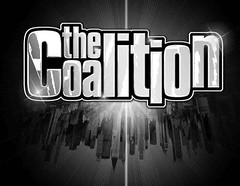« My nephew Will | Home | Pray for peace today in SoCal »
McLaren on being "Born Again"
By Jeremy | May 4, 2005
"To some people, the question ['Are you born-again?'] means 'Are you a judgmental, arrogant, narrow-minded, bigoted religious fanatic?' ... "Jesus originally used that term [born again] in a profound personal conversation with a sincere Pharisee. In that unique context, it meant a total reversal of everything Nicodemus assumed about what being religious was all about. It meant a radical humbling, a going back to the beginning, becoming a little child rather than a big religious scholar. ... In fact, it's really a study in the intentional use of ambiguity. But in typical modern fashion, we turn a profound and unique image into a simple, universal, mechanical formula and superficial slogan, and it becomes part of a slick sales pitch, and we mass market it everywhere. So now, 'Are you born-again?' means 'Have you said a little prayer at the end of a booklet?'" (pp. 104-05)Note to self: I realized a few minutes ago -- DOH! -- that my blogging about ANKOC is so 4 years ago. Apparently Andrew Jones (aka "TallSkinnyKiwi") and others are hosting McLaren on a "Blog Tour" promoting his third book in the ANKOC series. McLaren's "appearance" on TallSkinnyKiwi's blog? May 9.11 8 credit loan problem payday8 payday 11 advance loan ukequity loan hawaii home 90quick savings payday loan accountmortgage adjustable loanadjustable information loan raterate mortgage loan adjustable calculatordisclosure rate loan adjustable mortgagepayday illinois advance loanloan tax advance income
Topics: books, brian mclaren, emerging church, faith, theology | 1 Comment »

 Welcome to the professional website and personal weblog of Jeremy Del Rio. Whether you're a client, friend, or curious onlooker, please don't stay a spectator. Engage the conversation. Your contributions matter here.
Welcome to the professional website and personal weblog of Jeremy Del Rio. Whether you're a client, friend, or curious onlooker, please don't stay a spectator. Engage the conversation. Your contributions matter here.


















May 9th, 2005 at 12:18 pm
J, here’s my initial salvo on the book.
Caveats:
I read it in Puerto Rico, mostly either sitting on a beach or on a balcony overlooking the beach, so I may have been distracted a bit.
It was a good read as it kept me moving from one chapter to the next until I was done… in about 3 days. Lots of times I read the first few chapters of a book and say “OK, I get it.” and stop short. This one kept me until the end as I was anxious to hear what idea he had next.
I thought the fake dialogue would bug me but it was fine for the most part.
What I liked:
1) The idea that we are called to redeem the culture we live in, not isolate ourselves from it into a Christian sub-culture. (Amen, Brian.)
2) The idea that modernity does not equal Christianity, and that we need to be careful not to force God into our modern boxes. (This is true and hugely important for reaching a post-modern culture with the Gospel. Simple example… hitting someone with the 4 spiritual laws and a yes or no proposition on Jesus may have worked a generation ago, but it isn’t working in this one. Church after church has died because they did church in modern ways rather than in missional ones.)
Things I didn’t like:
1) The m.o. of setting up generalized strawmen to the knock down. (Can you imagine someone saying Jeremy DelRio and Benny Hinn are Christians… Benny Hinn is a heretical nutjob I wouldn’t trust with my lunch money, so Jeremy must be too? Not fair. McLaren clearly has had some bad church experiences, but the blame goes on those churches and not on all churches. The title of the book for example… what does Different mean? If being ‘different’ means different than the Oral Roberts crew, than amen. If different means different than 2000 years worth of beilevers, no thanks. What I mean is, he seems to be rebelling against a flawed picture of the Christian faith, an easy one to find fault with.)
2) The idea that the text of Scripture is always defined by context. (Here he begins to tread onto some scary ground with the idea that there is no meaning in the text but that which we bring to it. If everything in the Bible is up for grabs and can mean different things at different times for different people depending on their context, then we are putting ourselves above the Scriptures rather than forcing ourselves to sit under the text. Clearly exegiesis and hermeneutics are challenging endeavors, but we must hold fast to the belief that God has spoken in universal and eternal ways in the Scriptures. You pull that rug out and you’ve got nothing to stand on… you just make it up as you go based on your context, i.e. the idea that somehow at this point in Christian history homosexual intercourse is an acceptable moral activity… “I know God condemns homosexual activity from beginning to end of the Bible, but the Bible stopped being written 2000 years ago… if it was still being written, God would be inspiring people to condone homosexuality because our context has changed and God is love and God understands.” Dangerous ground Brian.)
3) The pooh poohing of individual sin in favor of corporate sin. (For example, the kid who stole the woman’s wallet is only partially guilty. She is at fault for having her wallet stolen because she didn’t give to the YMCA or vote Democrat. In fact, she is the bigger sinner because she was priveleged and should have known better. So let’s fix the system but not the individual. Now individual sinners are off the hook.)
4) The idea that preaching is less and less important in the life of the church. (God has ordained the preached Word as a means by which faith comes into the hearts of men and women. The day that we stop preaching Jesus because it doesn’t ‘connect’ with the culture is the day that we set off on our own and leave God’s Spirit behind. We need more preaching, not less.)
I am blanking out on what else. Maybe if we get into details it’ll come back to me. I am down with the church doing church in ways that the culture gets, but I am not down with softening the Gospel. This is the tough line that emerging churches walk.